Coronavirus lockdown: 'No dramatic overnight change' to restrictions
- Published
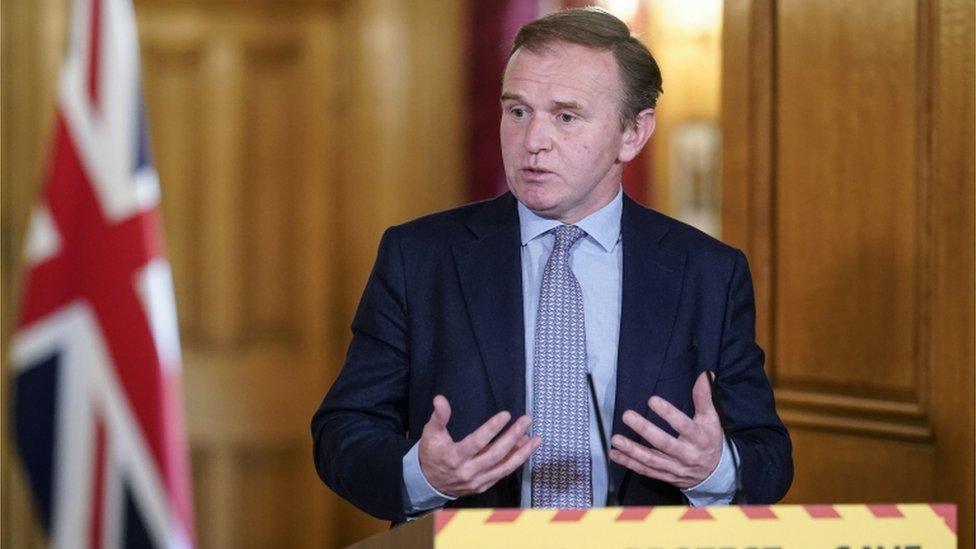
Environment minister George Eustice urged people to abide by the current rules to stay home
The public has to be "realistic" about the easing of lockdown restrictions, the environment secretary has said.
George Eustice also urged the public to abide by the current coronavirus measures over the weekend, with the PM due to deliver an update on Sunday.
Garden centres in England will be permitted to reopen from Wednesday, a senior government source has said.
Mr Eustice also announced a £16m fund to deliver millions of meals to those struggling during the pandemic.
A further 626 coronavirus deaths were confirmed on Friday, taking the UK total to 31,241, including a six-week-old baby with an underlying health condition.
Asked by the BBC's Ben Wright about whether Boris Johnson would ease restrictions in line with an announcement from Wales, Mr Eustice said there would be "no dramatic overnight change" and the government would be "very, very cautious as we loosen the restrictions we have".
Speaking at the No 10 daily briefing, he reiterated that the "stay at home" message remained in place over the "sunny bank holiday weekend".
He also said that while each of the devolved nations might take slightly different approaches, they were working together "to try to have a broadly similar UK approach".
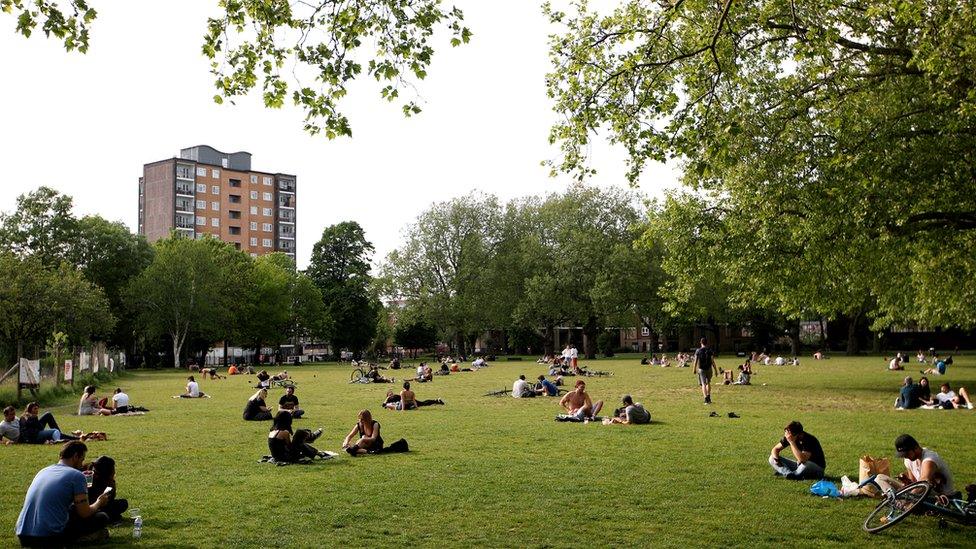
Wales will allow people exercise more than once a day and Scotland is considering similar measures
Meanwhile, UK airlines have said the government is set to impose a 14-day travel quarantine on arrivals from any country apart from the Republic of Ireland, a move which is expected to take effect at the end of the month.
People arriving in the country would have to self-isolate at a private residence and it is not clear how long the measure may be put in place.
Earlier, it was confirmed that garden centres in Wales would be able to reopen from Monday and the government has now confirmed similar plans for England.
Social-distancing measures will have to be obeyed but a senior government source said they were "typically open large open-air spaces where the risk of transmission of coronavirus is lower".
Any cafes or playgrounds associated with the retail space will have to remain closed, it is understood.
At the government's daily briefing, Mr Eustice said the government was considering changing the restrictions on funerals but said he did not want to prejudge what Mr Johnson would say on Sunday evening.
"People want the opportunity to pay their last respects - obviously we have to be very conscious of large social gatherings but it is something we are giving consideration to," he said.
Currently lockdown measures allow members of the deceased's household and close family members or friends, to be present at a funeral, alongside the funeral staff and chapel attendant.
The environment secretary also said it was safe for takeaway food shops to reopen, adding that McDonald's drive-thru restaurants were "made for social distancing".
Many high street chains including McDonald's, Greggs and KFC chose to shut their doors during the lockdown - although some have begun the process of reopening.
"I think it is quite possible for these venues to reopen and reopen safely, we never mandated that they should close," he added.
Scotland, Wales and Northern Ireland have the power to make their own decisions on lockdown regulations - and could lift restrictions at a different rate.
Earlier, Wales First Minister Mark Drakeford said he wanted the nation to move in step with the rest of the UK when he announced the changes to its lockdown, which included allowing garden centres and libraries to reopen as well as letting people exercise outside more often.
Scotland's First Minister Nicola Sturgeon said on Friday the only change she was considering in the immediate term was on the limits to outdoor exercise.
Ms Sturgeon said there had been a "helpful recognition" from the prime minister that the four UK nations "may well move at different speeds if our data about the spread of the virus says that that is necessary to suppress it".
Arlene Foster, Northern Ireland's First Minister, said there would only be "nuanced changes" to measures in the region.

A SIMPLE GUIDE: How do I protect myself?
AVOIDING CONTACT: The rules on self-isolation and exercise
HOPE AND LOSS: Your coronavirus stories
LOOK-UP TOOL: Check cases in your area
FACE MASKS: Should I be wearing one?

The government announced 97,029 tests had been delivered in the 24 hours to 09:00 BST on Friday, just shy of the 100,000 target Health Secretary Matt Hancock set for the end of April.
That aim was achieved on 30 April and 1 May but has not been reached since.
When asked why in some cases it was taking up to 10 days for people to get their test results back, Mr Eustice said there would be daily fluctuations in availability of tests in any given area.
"You will get some days of surplus tests where people haven't come forward to take them in some areas, and you will have other areas where you don't have quite enough capacity for that local demand," he said.
The prime minister has set a target of increasing testing capacity to 200,000 by the end of May.
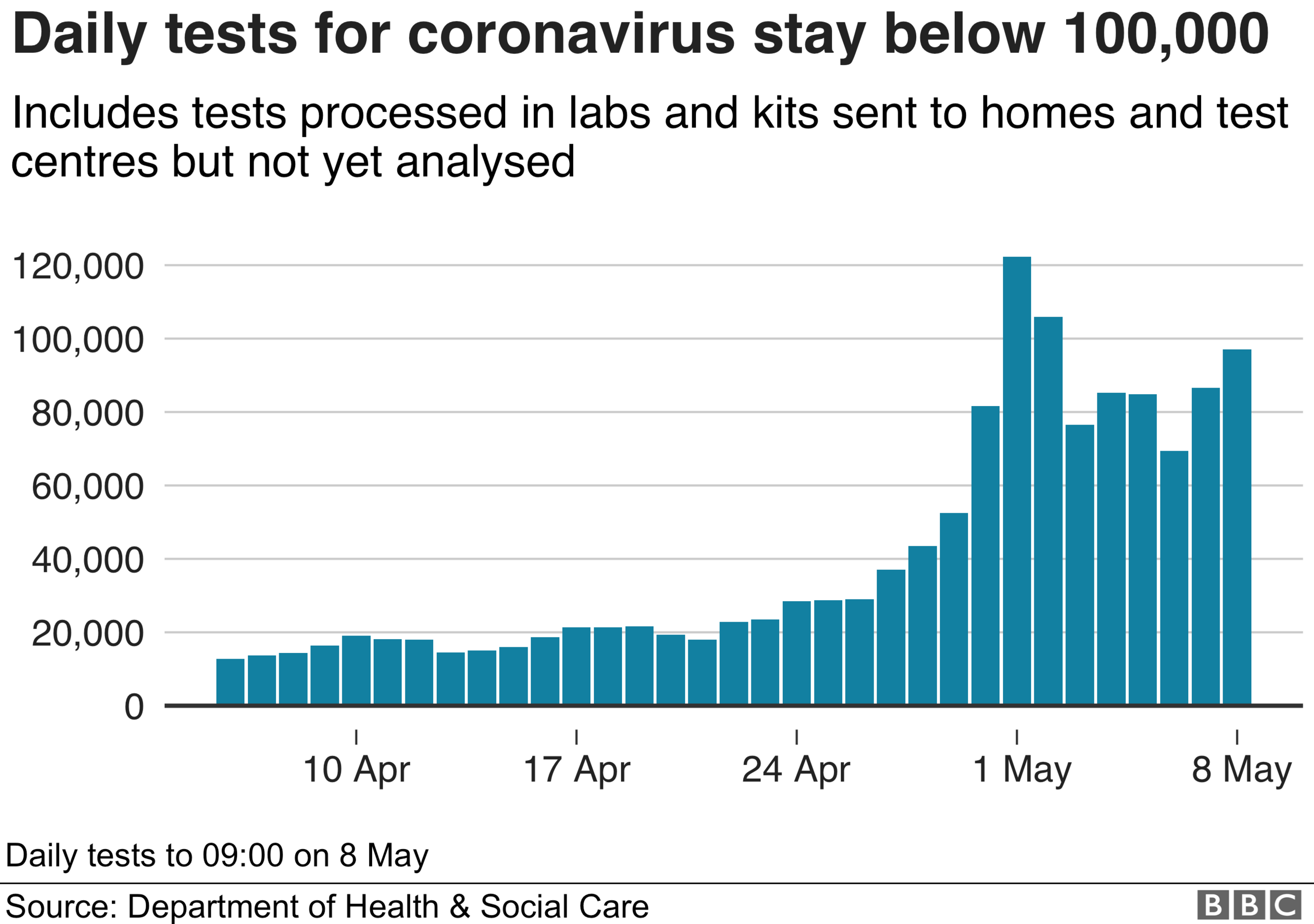
Asked whether the R rate - the rate at which the virus spreads - had to remain universally low before lockdown could be lifted, Prof Stephen Powis, national medical director of NHS England, said it would vary from place to place but "the important thing is that as a whole it stays below one".
The R rate is the number of people that one infected person will pass the virus on to on average.
Prof Powis also told the briefing that data would be published on the deaths of those with learning disabilities and autism who had tested positive for coronavirus.
He said: "We're looking at how we can report on those groups and I'll commit that from next week we will be publishing data on learning disabilities, autism and mental health patients who died in acute hospitals, and we'll do that on an ongoing basis."
Mr Eustice announced more support for vulnerable people, saying millions of meals would be delivered over the next 12 weeks to help during "this enormously challenging time".
At least 5,000 frontline charities across England will benefit from the £16m fund which comes from the £750m pot announced for charities by Chancellor Rishi Sunak on 8 April.
"These are extraordinary times but I think that £750m is very welcome and it's helped a lot of charities with the additional burdens that they have as a result of the coronavirus," Mr Eustice added.
In other developments:
The UK has marked the 75th anniversary of Victory in Europe Day, with celebrations limited by the pandemic
Italy has become the first country in the EU to register more than 30,000 coronavirus-related deaths
Boris Johnson has spoken to the European Commission president about the approach to tackling the virus
The prime minister also spoke with Russian President Vladimir Putin and German Chancellor Angela Merkel to mark VE Day, and discussed the importance of working together in response to the pandemic with both leaders
And three people who travelled from Berkshire to the Dorset coast for a day out during the lockdown sparked a major rescue operation after getting cut off by the tide
- Published8 May 2020
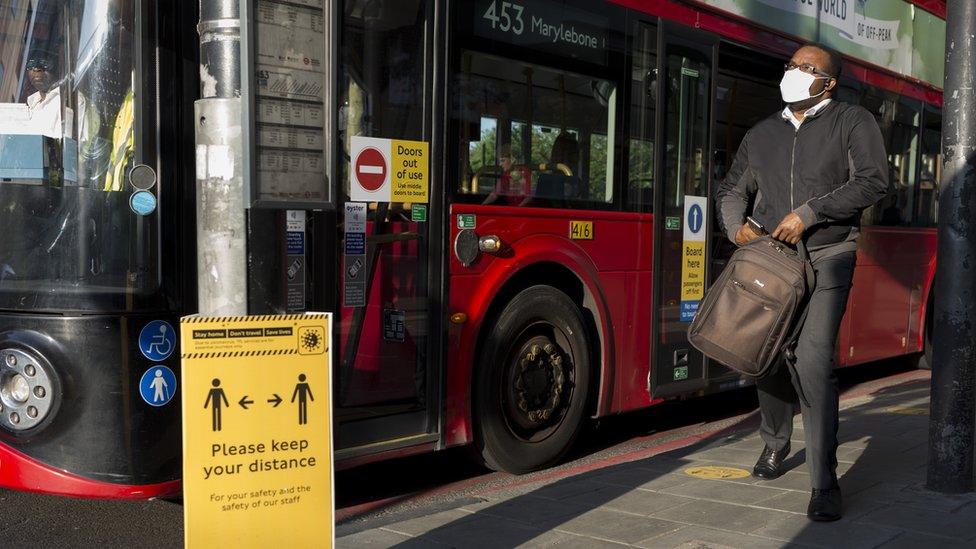
- Published8 May 2020
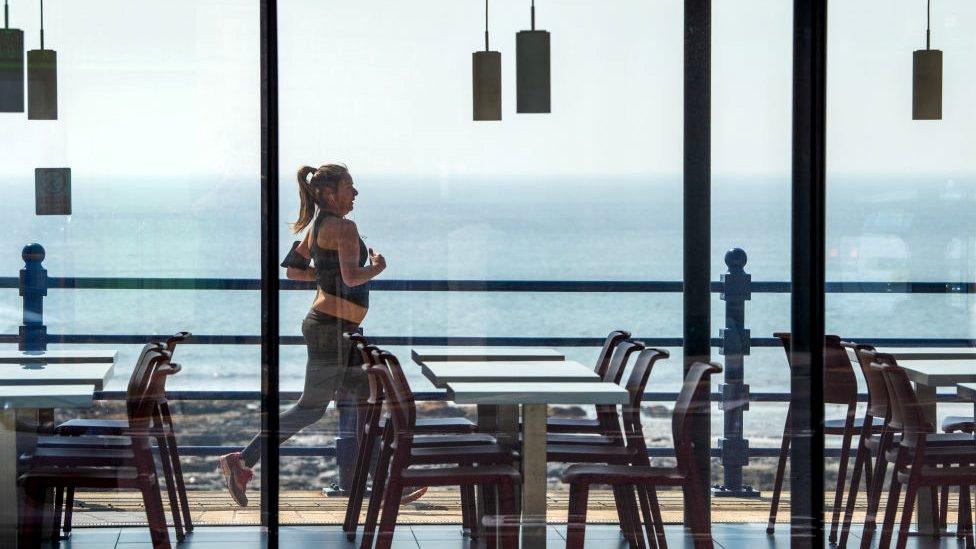
- Published1 July 2022

- Published8 May 2020

- Published7 May 2020